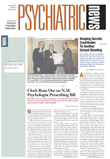Every now and again an experience can reframe your view, alter a reference point, or provide new depth. Often that experience is a piece of art or a new book. For me recently, it has been APA’s Business Relationship Initiative.
I was lucky enough to be appointed to this committee when it started up about a year ago. The committee, working with APA staff and a business consultant, was charged with furthering the work of a previous task force in developing a dialogue with business. The argument is simple: Employers are the purchasers of health plans for their employees, including their mental health benefit package. Educating these employers about the effectiveness and cost savings of appropriate mental health treatment potentially benefits everyone, most importantly the employee/patient.
We don’t often think about the work we do as “cost-effective” or “productivity enhancing.” But it’s true: mentally ill employees are expensive to businesses. Anxiety, depression, and substance abuse are the big three. For example, one recent study found that the workplace cost of anxiety was $42.3 billion in 1990 in the U.S., or $1,542 per sufferer, according to Greenberg et al. in the study, “The Economic Burden of Anxiety Disorders in the 1990s,” which appeared in the July 1999 Journal of Clinical Psychiatry. About 88 percent of those workplace costs were due to lost productivity when the anxious employee was at work. Greater awareness, recognition, and appropriate early intervention become “cost savers” in this setting.
Some psychiatrists may find such a notion distasteful. The limbic response can be an image of cutthroat wheeler-dealers out for themselves at any cost. (The advent of managed care with its emphasis on the bottom line rather than clinical care has not helped.)
In fact, the business representatives with whom our committee members have met so far, most of them executives of large corporations, have been anything but such a caricature. They have been curious and respectful, eager to hear our thoughts and suggestions. They also have seemed pleasantly surprised by our willingness to talk a language familiar to them and by our down-to-earth approach that seems tacitly to discount their stereotyped notions of psychiatrists. (What’s that joke about the light bulb? One psychiatrist to change it and at least 10 to process?)
In our talks with business executives, certain themes are emerging that seem important for all of us as we think about the future. First, some businesses seem increasingly less satisfied with the service they are getting from managed care as we know it. While some cost savings may have been realized, they have also seen the price of less than optimal mental health coverage for their employees. Some of the talk now is about “defined contributions”: Rather than buying a benefit package and sharing the cost with employees, employers will pay a fixed sum into a medical account for the employee to use as he or she chooses.
In addition, several businesses with which we have talked are concerned about the costs of disability. They would like to see psychiatrists work more closely with employers to suggest modifications that would allow an employee to return to work. (That seemed to me to make disability a lot more interesting clinically. I used to dread seeing disability forms. Countertransferential assumptions kicked in right away about Axis II pathology and becoming mired in paperwork. A creative clinical solution involving patient and employer seemed, at least theoretically, a lot more appealing and constructive.)
Finally, although the businesses we have contacted seem willing to hear our arguments about the value of psychiatric treatment, we don’t have enough hard data to back us up. And in a world where various mental health professions are vying for time and money, and patients are becoming more active consumers of mental health care (and will become more so if defined contribution becomes the way of the future), this lack of data is a problem.
For example, it seems intuitively true that having a psychiatrist (as opposed to, say, a social worker) do an initial evaluation of a patient with a mental illness would be more inclusive and efficient, lead to more appropriate recommendations and referrals, and ultimately save time and money. But we don’t have definitive proof from well-done research studies. We need to study the question. And when we study the question, we need to be prepared for a whole set of outcomes that may be different from the one we want. (Our committee is looking at exactly these kinds of research projects, and some of our business contacts are suggesting ways in which we can collaborate on such projects.)
I see these trends as opportunities, and I believe residents are ripe for such opportunities. We have had to learn flexibility, including a facility in understanding at least some economic issues (thanks to managed care). In that sense, we are positioned well to explore a far wider range of possibilities within psychiatry than our supervisors may ever have imagined. The world is truly our oyster. ▪

